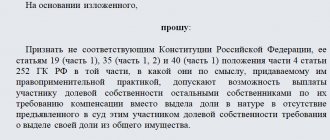The current criminal legislation of the Russian Federation provides for various forms of legal measures against persons who have committed crimes. The most common among them is imprisonment for a certain period.
However, in a number of cases, a citizen who has stumbled may be given a different punishment that does not involve a long prison sentence. In this case, we should highlight forced labor, which began to be prescribed by domestic courts relatively recently.
What it is
Forced labor, as a type of criminal punishment, is imposed on citizens who have been sentenced by a court for committing a particular crime. The grounds for involving a convicted person in this form of work, as well as the procedure for such assignment, are established by Art. 53.1 of the Criminal Code of the Russian Federation.
At its core, this measure of criminal law is the involvement of a convicted citizen in labor , the location and nature of which is determined by the court.
Free legal consultation
+8 800 100-61-94
It should be noted that the possibility of forced labor as a substitute for prison punishment appeared in Russian criminal practice relatively recently.
Reference! Corresponding amendments were made to the Criminal Code of the Russian Federation only in 2011.
However, in reality this form of punishment was not used, since the domestic penitentiary system was not technically ready for these innovations. It should be noted that the first convicts began correctional work only in 2021, when corresponding correctional centers were opened on the territory of several constituent entities of the Federation.
Kinds
It is customary to distinguish two types of forced labor, which depend on the territorial location of correctional centers.
Thus, this punishment can be imposed and carried out to be served on the territory of the subject of the Federation where the convicted person permanently resides . According to the legislator's plans, it is precisely this circumstance, among other things, that distinguishes this type from others provided for by criminal law.
However, there is also a practice when a person is assigned work outside his region of residence. This is due to the lack of correctional centers, as well as their limited capacity.
Differences from mandatory and corrective
The current criminal legislation, in addition to forced labor, also involves the involvement of convicts in compulsory and correctional labor. All these forms of criminal legal influence on the convicted person have their own characteristics.
Thus, it has been established that for forced labor the convicted person receives payment for his work . This is a fundamental difference from mandatory ones, in which payment for labor is not expected.
In addition, they are carried out at correctional centers on the territory of the subject of the Federation where the person sentenced to them lives. At the same time, they can be subject to correctional labor in any region of our country.
Places of departure
There are special institutions for this – correctional centers. They are being created in a number of regions of the Russian Federation.
Each center has its own rules that every prisoner must follow.
A kind of executive center is a kind of colony with a significantly simplified regime of detention.
In particular, convicts can periodically see their relatives. People do not live in prison cells, but in dormitories specially created for this purpose. In addition, it is possible to live with their own families.
The convicted person may have funds, things and objects at his disposal according to the list determined by the internal labor regulations.
In order to arrive at the enforcement center, the citizen is given a special order. It indicates the date of arrival, taking into account the time required for travel. Its payment is carried out at public expense.
In what cases are they prescribed?
The introduction of a new form of criminal punishment was carried out solely on the basis of considerations of humanity. Today it is considered as an alternative to real imprisonment in the MLS. In this regard, criminals who have committed crimes of minor or moderate gravity are sentenced to forced labor. In addition, this form of punishment is provided for persons who have committed a criminal offense through negligence , without intent or motive.
The state reasonably believes that citizens who have committed crimes of this kind do not need to remain in prison for correction, where they can come into contact with professional criminals who commit crimes knowingly and repeatedly. Despite the fact that this decision looks absolutely correct, representatives of the Federal Penitentiary Service note that the practice of forced labor is not widespread.
Procedure for appointment and departure
Forced labor is imposed only by court decision as punishment for a crime committed. At the same time, the law contains certain restrictions related to the circle of persons to whom forced labor is not assigned.
These include:
- persons under the age of 18;
- disabled people of groups I and II;
- women expecting a child, as well as raising a child under 3 years of age;
- persons engaged in military service;
- senior citizens who have reached retirement age.
It has been established that convicted citizens solve certain tasks that do not require any qualifications. They may be related to landscaping, cleaning streets and park areas, and so on. In addition, the work is carried out in full compliance with legal requirements.
In addition to carrying out work, convicts are required to periodically report to the penal inspection and correctional center.
The law stipulates that convicts receive payment for their work. As a rule, it does not exceed the established minimum wage. In this case, a certain part of the funds that the sentenced person receives is transferred to the account of the FSIN authority in the region where the work is carried out. This amount can vary, ranging from 5% to 20% of total income. In this case, the specific percentage of deductions is established by the court.
Violations and evasion
In case of violation of the order or conditions of stay in a correctional institution, the above penalties are applied to the convicted person.
Classification of violations:
- Simple violations.
- Malicious violations.
- Evasion.
Violations include actions that violate order and discipline, violation of the rules of residence and internal regulations.
Malicious violations include the use of alcoholic beverages and drugs, hooliganism, refusal to obey or insulting the administration, organization and participation in any acts of disobedience, refusal to work, unauthorized departure from the territory of the correctional center, and being late for more than a day.
Those who evade work will face a punishment more severe than a simple penalty. Those who did not arrive at the correctional center within the prescribed time limit, who did not return on time or left their place of work or center without permission, are put on the wanted list and detained for 48 hours or, by a court decision, for 30 days.
For those who evade receiving the order, work by court decision is replaced by imprisonment with the calculation of one day for one day.
Where can they send
Compulsory labor is carried out in special institutions of the penitentiary system - correctional centers. It is planned that such centers should exist in almost every region of the country.
However, in practice today there are four of them in Russia in the following regions:
- Primorsky Krai;
- Tyumen region;
- Stavropol region;
- Tambov Region.
The centers operating today are ready to accommodate about 900 people. It is obvious that this capacity indicator is critically low, while there is no open data on the organization of additional centers.
How often are they used in practice?
In many ways, the assignment of forced labor depends on the nature of the crime committed, the identity of the accused, the presence of mitigating circumstances, which include voluntary repentance and willingness to compensate for damage.
The line of defense built by the lawyer is also important. He must convince the court that forced labor will be the most effective punishment for the client.
Taking into account the workload of the penitentiary system, courts impose forced labor quite often. Let us emphasize that it is very important to correctly build a line of defense.
Deadlines
In accordance with Article 58.1 of the Criminal Code of the Russian Federation, courts can impose this type of punishment within different periods. Thus, the minimum period is 2 months, but the maximum period is 5 years. In the latter case, this form of punishment is quite severe and is determined for persons who have committed crimes of moderate gravity.
It has been established that in a number of cases (for example, when an amnesty is declared), a person can be released from further serving his sentence. Moreover, the basis for this, chosen as an example, is not rehabilitative.
Important! According to established practice, on average, the terms of involving a convicted person in forced labor rarely exceed 2 calendar years.
Execution procedures
In accordance with Art. 60.2 of the Penal Code of the Russian Federation, a person convicted independently (with the exception of persons in custody), but at the expense of the state, is sent to the place of execution of the sentence. The period within which the convicted person must appear at the institution is established by order of the territorial body of the penal system. Control over the execution and compliance by the convicted person with all established requirements is assigned to the administration of the institution, in accordance with Part 1 of Art. 60.18:
Supervision over the serving of sentences by those sentenced to forced labor is carried out by the administration of the correctional center and consists of monitoring and monitoring the behavior of convicts in the correctional center and at the place of work, as well as in other places of their stay. The procedure for exercising supervision is determined by the federal executive body that carries out the functions of developing and implementing state policy and legal regulation in the field of execution of criminal penalties.
It would be illogical and inappropriate to list all the procedures established by law within the framework of this article, so you can familiarize yourself with them in more detail in Chapter 8.1 of the Criminal Code of the Russian Federation.
Could there be a ban?
Forced labor, as the name of this measure of criminal law implies, is mandatory. This means that the convicted person is obliged to comply with them, and refusal to implement them is not justified. At the same time, the nature of work is determined by the bodies of the penitentiary system, that is, a person does not have the right to independently choose it.
In this regard, many citizens and some human rights organizations have doubts about the legality of applying this type of punishment, since the Basic Law of the Russian Federation directly states the prohibition of forced labor and attempts to involve people in it.
However, from the point of view of current legislation, this form of criminal punishment does not violate the basic principles of human rights and freedoms.
International agreements existing today, which are predominantly declarative in nature, establish that forced labor is possible if it is a form of criminal law influence on the offender. The same rule applies, for example, to the army, where, by order, a serviceman can be involved in one or another activity without the right to refuse to perform it.
Thus, the involvement of convicts in forced labor, being a form of criminal punishment, does not contradict the Constitution of the Russian Federation, as well as the main international declarations and agreements.
Correctional centers
As already mentioned, a court decision on punishment by forced labor is executed in special centers in the region of residence or receipt of the sentence; it is allowed to create an isolated area at the institution, operating as a correctional center.
Convicts who are at large at the time of sentencing, and those who have had part of their sentence of imprisonment replaced by work, are sent to the center on their own. They must be on site no later than the time specified in the order of the penal system authority. Travel and food are paid by the state.
Those convicts who were in custody at the time of the verdict are sent to the correctional facility accompanied by an escort and are released upon arrival.
The correctional center is subject to round-the-clock supervision; staying there is regulated by internal regulations, mandatory for convicts; in addition, they are required to carry out the work assigned to them and constantly remain on the territory of the institution. A dormitory has been set up for convicts to live in; it is forbidden to leave it without permission from the administration during non-working hours, including on weekends and holidays.
There are other prohibitions. There is a list of prohibited items and substances. The living quarters and personal belongings of convicted persons may be searched; if such items are found, they are taken for storage or destroyed.
Convicts are required to always carry an identity document with them, and also perform free work to maintain order in the center, but no more than two hours a week.
In essence, such work in criminal law refers to lighter penalties. In addition to educational work, incentives are also used. This may include giving thanks, early termination of work, or providing the opportunity to temporarily leave the correctional center.
Staying outside the center’s territory is possible with the permission of the administration:
- up to five days to resolve urgent issues - immediately;
- 18 calendar days - annual paid leave - for those without penalties who have served 1/3 of the sentence. Unemployed convicts are not granted annual leave;
- living with family on the territory of the nearest municipality - without penalties, having served 1/3 of the sentence.
Part-time study is permitted to obtain secondary or higher vocational education if the educational institution is located on the territory of the municipality closest to the correctional institution.
Well, accordingly, there are penalties for violations. Briefly, this could be a reprimand, arrest for 15 days, revocation of permission to live in a non-dormitory.
Convicts are provided with sleeping places in a dormitory and bedding. They must provide themselves with clothing, shoes and food. If the convicts do not have their own money, the administration of the correctional institution takes care of the provision according to established standards. Subsequently, the convicted are obliged to return the money spent on them.
The administration is obliged to provide a person serving a sentence with a workplace, taking into account individual characteristics. The convicted person himself is deprived of the right to refuse the offered place.
The work of convicts is regulated by the Labor Code of the Russian Federation; this does not apply only to the rules of admission, dismissal from work, transfer and refusal of work, as well as the provision of annual leave.
Most often, work for convicts is provided in the housing and communal services sector. This mainly involves garbage collection and landscaping. One of the first state corporations to agree to provide jobs for those sentenced to forced labor was Russian Railways. Work is underway to attract other companies. When locating centers, areas where there is a shortage of workers are taken into account.
From the wages of convicted persons, the amount established by a court decision is withheld in favor of the state or another person, if the sentence was passed for non-payment of debts, as well as to compensate for the costs of its maintenance. The convicted persons themselves are paid at least 25% of their wages.
Work evasion
As already noted, forced labor is an alternative to serving a sentence in places of deprivation of liberty - correctional colonies. Thus, the law allows for the possibility of changing the form of punishment to a more severe one.
In cases where a convicted person refuses to carry out orders from representatives of the penal inspection, neglects the duties assigned to him and avoids performing work in every possible way, he may be placed in a colony . The same rule applies to cases where the convicted person does not comply with the established rules for serving the sentence.
It should be noted that despite the fact that serving a sentence in a prison camp is a more severe punishment, when determining the time spent in a colony, the principle of “1 day of correctional labor for 1 day in a colony” is used. That is, in fact, instead of forced labor, the convict will serve the rest of the sentence in a colony.







